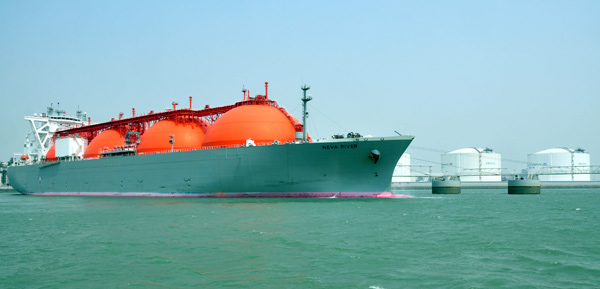

Nation seeks to reduce use of fossil fuels in move to improve air quality
|
 |
|
A vessel, loaded with more than 60,000 tons of imported LNG, docks at a port in Putian, Fujian province. China imports a growing amount of natural gas to meet domestic demand. In the first 10 months of 2013, the country’s natural gas use was at 134.3 billion cubic meters. Provided to China Daily |
China's dependency on natural gas imports will continue to increase as the country is trying to reduce its fossil fuel consumption and improve air quality, experts said.
Up to 32 percent of China's natural gas use this year will depend on imports, Wang Xiaokun, an analyst at domestic commodities consultancy Sublime China Information Group Co Ltd, said on Tuesday.
Last year, 29 percent of China's natural gas came from foreign sources, according to the consultancy's estimates based on data from the National Bureau of Statistics and import data from the customs office.
The figure grew to 32 percent for the first 10 months of this year. Wang estimated it will stay at around that level for the full year.
"China's dependency on foreign natural gas supplies will continue to grow because the output of existing domestic gas fields is decreasing, while the country's demand is rapidly increasing," she said.
In 2012, China used 151.4 billion cubic meters of natural gas, up 16 percent year-on-year. In the first 10 months of 2013, the country's natural gas consumption was at 134.3 billion cubic meters.
Wang estimated that full-year natural gas use will reach 170 billion cubic meters, up 12.3 percent from the previous year.
Because of growing demand, China's natural gas imports have been boosted in recent years. Natural gas imports soared from 940 million cubic meters in 2006 to 31.4 billion cubic meters in 2011.
According to China National Petroleum Corp's Economics and Technology Research Institute, the nation imported 42.8 billion cubic meters of natural gas in 2012, accounting for 29 percent of the country's total gas consumption.
The institute estimated that China will import 53 billion cubic meters of natural gas this year, up 23.8 percent year-on-year.
As the country's biggest natural gas producer and importer, China National Petroleum Corp will continue to boost natural gas imports, with more investments in pipelines and liquefied natural gas projects, said Zhou Jiping, chairman of the company.
He said China's natural gas projects are playing a big role in the country's drive to improve its air quality.
In addition to imports, the Chinese government is also making efforts to support the development of unconventional natural gas projects to increase domestic output and ease the supply shortage.
"The Chinese government encourages the development of unconventional gas projects, including shale gas, coal bed methane gas and coal gas to meet the soaring domestic demand," said Wang. "However, technology obstacles and environmental issues will be the major difficulties for the development of these resources."
Shale gas exploration projects require lots of fresh water, which the country doesn't have in many areas where the shale gas reserves are located, said Wang.
Another downside is that exploration projects can endanger the water quality.
Also, in terms of coal bed methane gas development projects, coal companies sometimes own the rights to develop coal mines without the rights for the coal bed methane gas resources, which are owned by other companies, adding an extra layer of complexity to the process.
However, there are also positive factors.
"The cost of fossil fuel imports will stabilize and even become cheaper because of the rapid development of shale gas exploration projects in the United States," said Yukari Yamashita, a director at Japan's Institute of Energy Economics, during an industrial symposium held in Beijing earlier this month.
She said that a net fossil fuel export increase will have a great impact in Asian markets and that an expansion of unconventional natural gas production will generally lower energy prices.
As the US develops into an energy-independent country, there will be an increased natural gas trading volume in the global market, which is good news for energy-hungry China, she added.
Recently, Russia lowered the price of its natural gas exports to Ukraine because of shrinking demand from Europe, which might also be positive for China, said Wang at Sublime China Information Group.
"Russia's economy is heavily dependent on its energy exports, especially natural gas," Wang said. "Pressured by the lackluster European market and increasing exports from the US, Russia will likely set more reasonable gas export prices soon."
 Christmas sales attract customers in China
Christmas sales attract customers in China
 Smooth ride at Harbin amusement park
Smooth ride at Harbin amusement park
 In the frame
In the frame
 China-exclusive new Citroen DS 5LS sedan in Paris
China-exclusive new Citroen DS 5LS sedan in Paris
 Lamborghini launches Aventador LP 720-4 50° Anniversario
Lamborghini launches Aventador LP 720-4 50° Anniversario
 Model with modified Audi R8
Model with modified Audi R8
 Bordeaux wine shop and bar opens in Beijing
Bordeaux wine shop and bar opens in Beijing
 Chinese bellybands easy to stomach
Chinese bellybands easy to stomach